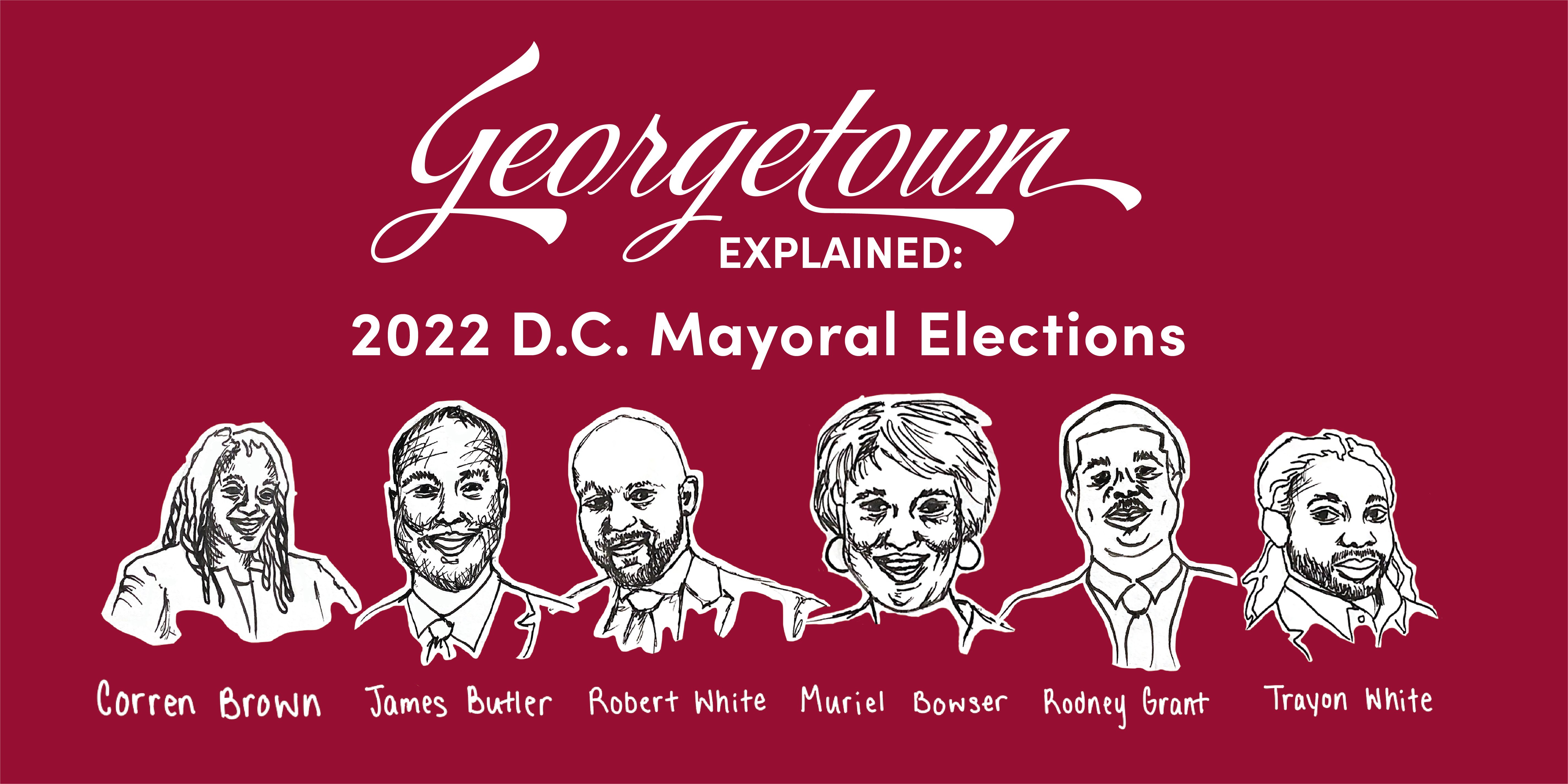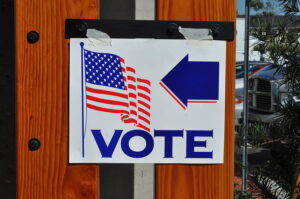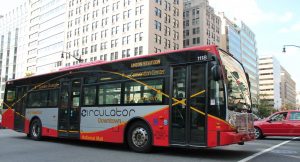Though less than 2 percent of Georgetown students are from D.C., all are impacted by the laws made by the city’s elected officials. In the absence of congressional representation, D.C. residents’ primary democratic power rests in their ability to elect a mayor.
Residents have the chance to cast a ballot in the biennial general election for the mayor and municipal positions. The Voice sat down with several candidates to guide students through the upcoming 2022 mayoral election.
The U.S. Congress exercises nearly absolute control over the District, from regulating its political system to its funding. Due to the city’s status as a federal territory, the mayor assumes many of the responsibilities of a governor—overseeing police and fire protection, and running public agencies and the public school system. The D.C. Council is tasked with formulating the budget, setting tax rates, and forming District agencies. Congress retains veto power over actions that threaten federal interests and approves budgets with a majority congressional vote.
This year’s election is especially fraught, as the District emerges from the worst impacts of the COVID-19 pandemic, a housing crisis affecting thousands of residents, and some of the highest rates of gentrification in the country.
This mayoral election cycle will also be the first under new campaign finance regulations. The District’s Fair Elections Program is a new campaign finance option for qualifying candidates meant to make elections more diverse and financially accessible.
Instituted in 2018, the program rewards candidates who have collected a certain number of small-dollar donations from D.C. residents and eschewed corporate contributions. Those who comply receive an initial lump sum to kickstart their campaign and will have any small donations from residents matched five to one. The program aims to lower entry barriers, expand the slate of candidates, and reduce the scope of corporate funding in D.C. politics. In the last election cycle, the program distributed nearly $4 million to candidates.
The primary for the mayoral election is set for June 21, 2022, and the general election—which includes the mayoral race, the attorney general, two at-large council seats, and the council seats for Wards 1, 3, 5, and 6—is set for Nov. 8, 2022. Because D.C.’s population is nearly 76 percent Democratic, the primary has always determined the mayoral election outcome.
Although the election is months away, most of the predicted big players have announced, and as candidates start campaigning, here is your guide to all the names you’re going to hear.
Meet the candidates
Likely the most recognizable name on the list of candidates, current two-term D.C. Mayor Muriel Bowser announced she would seek a historic third term in office on Nov. 4. “There are still challenges for us to tackle, and we have more work to do,” Bowser wrote on Twitter. “That’s why I am running for reelection to be your mayor of the greatest city in the world, my hometown, and soon to be the #51stState.”
“We really have to focus on our [COVID-19] recovery for the next four years. We’re not done,” Bowser said in an interview. She highlighted the increased size of the metropolitan police force, D.C.’s relatively successful vaccination campaign, and the increased education rate as successes under her leadership.
Her 2018 reelection campaign saw her win with nearly 75 percent of votes in the primary and general election. Her citywide approval rate is currently 71 percent. However, Bowser faces criticism for rising homicide rates in the city (despite a decrease in violent crime since 2019) and slow progress on expanding affordable housing, despite having invested over half a billion dollars in housing programs. If she wins, she would be the first incumbent to win a third term since Marion Barry in 1986. Bowser did not respond for comment.
Displeasure with the current administration has motivated other elected officials to oppose her. Trayon White, council member for Ward 8, chose by far the most unique method of announcing his campaign: “I’m running,” he commented on an Instagram post by the popular Washington Probs account about the candidacy of another council member, Robert White.
Trayon White began his career serving on the D.C. Board of Education for Ward 8 and has acted as the area’s councilmember since 2016.
He has criticized the Bowser administration for failing to maximize spending for low-income housing. His posts on social media have also created controversy. Although Trayon White is fully vaccinated, he has posted about not promoting the COVID-19 vaccine, in contrast to Mayor Bowser’s sweeping mask and vaccine mandates. He was the sole dissenting vote in a bill that would mandate council members and their staff receive COVID-19 vaccines. In 2018, White posted a video on Facebook claiming that a prominent Jewish family could control the weather.
Throughout his time on city council, Trayon White has focused on gun violence prevention. Nearly 40 percent of gunfire in the District is concentrated in 2 percent of the city, predominantly Wards 7 and 8. White called for Bowser to enact a state of emergency to combat gun violence in D.C., which she did not do. He has also helped to co-author bills aimed at preventing gentrification and ending the punishment of suspending driver’s licenses for unpaid tickets.
While Trayon White has not clearly defined what issues he would tackle as mayor, he has been vocal about the affordable housing crisis. He took to Facebook to express his disappointment with a recent audit that found D.C. does not spend enough money on affordable housing projects.
“It is no secret that D.C. has an issue with affordable housing,” he wrote. “The administration doubled down on the misspending and a lot of people got richer while poor families remained homeless and hopeless.”
Another D.C. council member, one of the two at-large members, and Ward 4 resident Robert White also is tackling issues of systemic injustice.
A left-leaning Democrat, Robert White’s politics see him occasionally criticize and even oppose the more moderate Mayor Bowser. He has helped pass legislation imposing higher taxes on the wealthy, establishing paid parental leave, and advocating for reduced spending on law enforcement—over Bowser’s objections.
White’s efforts to expand affordable housing and address homelessness in D.C. have conflicted with Bowser’s pilot program, Coordinated Assistance and Resources for Encampments (CARE), which aims to clear five large homeless encampments in the city and relocate the encampments’ residents into more permanent housing. Together with three other council members, White questioned the decision to clear out encampments during hypothermia season.
“The goal of this program was not to house people, but to move people,” White said in a recent joint city council meeting, questioning the mayor’s intentions.
Apart from Bowser and other council members, former Ward 5 ANC commissioner James Butler wants to represent a departure from the status quo. “Any other candidate besides me will be more of the same. You already know what they’re going to do,” Butler said in an interview with the Voice. “America is a bright beacon on the hill, the envy of the world, and our mayor should be the things emblematic of the best leaders in the world.”
Butler ran for mayor in 2018 and lost the primary by nearly 54,000 votes. “I determined the minute I lost the primary that I was going to run again,” Butler said.
Butler’s key policy focuses include combating rising rates of gentrification, providing expanded services to vulnerable populations, and supporting reparations for the District’s Black residents.
“I believe in fairness. When I see families that look like me, forced from a city they’ve called home for multiple generations because of the gentrification and the rate they’ve been gentrified, someone needs to give them a fighting chance,” Butler said. “Sometimes you are that someone.”
Butler highlighted his plans for reparations to the descendants of Black enslaved persons, which would work to create a public-private partnership with local universities to grant descendants tuition-free degrees. He is the only candidate to support reparations to the Black community. “A token of reparations would go a long way towards bridging the divide of racial gaps in this country, and the harsh feelings certain groups have towards one another,” Butler said.
His plans also include temporary housing, social services, and behavioral and mental health resources for people experiencing homelessness. Butler also aims to increase the number of police officers, enforce no loitering laws, create a gun violence interdiction unit to tackle gun violence, and change the income calculator to redefine affordability.
Also new to the political scene, Corren Brown is running as a candidate from the Statehood Green Party. “My goal is to knock on every door in D.C. so that I can talk to every person and hit every voice,” Brown said in an interview with the Voice. “I’m not here to sell any false dreams.”
Brown has lived in the city her entire life and has worked in District corrections for the past six years. She feels that being brand new to the political scene is a strength, not a weakness. “My perspective is way brighter. It’s newer, it’s fresher,” Brown said.
Brown’s experience as a correctional officer exposed her to issues like criminal justice reform and homelessness. Brown added that for her, corrections was initially a profession of last resort—she needed income in order to raise a child. Now, she wants to influence how policing is changed.
“Policing is a really tricky topic. I believe that new policies need to be put in place first and foremost,” Brown said. “The way that policing has been done needs to be changed, whether it’s a whole new, a whole new aura to it or if we upgrade it to a better system.”
Educational equity also motivates Brown’s candidacy. Ward 8, which is predominantly lower-income and Black, receives the lowest funding and most severe budget cuts for schooling from the District despite having the greatest number of school-aged children. East of the Anacostia River, there are no schools with a specific priority, such as sports, arts, or academics. “I believe that the funds should be balanced because without true funding, how can we really excel the kids within that school?” Brown said.
Another candidate new to the political scene, Michael Campbell, a pastor at Kingdom Driven Ministries, has been involved in gun violence prevention work in the District through his work as the D.C. chapter president of Rev. Al Sharpton’s National Action Network.
Improving educational equity, ending poverty and homelessness, fighting crime, and combating climate change are campaign priorities for Campbell. He is a supporter of a $20 minimum wage and building a “Tiny Homes Village’’ to provide transitional housing to those experiencing homelessness. Increasing the salaries of police officers is also a key part of Campbell’s platform for reducing crime in the District.
Rodney “Red” Grant, comedian and founder of “Don’t Shoot Guns, Shoot Cameras,” a gun-violence prevention program focused on teaching young people filmmaking skills, has also entered the race. His experiences growing up in the D.C. public school system compelled him to make educational equity a major platform of his campaign. He hopes to provide more artistic and humanities-based opportunities for students.
“I am a product of the arts and humanities community and it has contributed tremendously to my success. Arts and humanities are a major component of education, and should be accessible to all young people, not just some,” Grant wrote in an email to the Voice.
One of the earliest candidates to announce, Grant was motivated to run after observing a rift between D.C. residents and government policy. “I decided to run for mayor because D.C. is the city that raised me, and I saw a disconnect happening in our nation’s capital. Our government had become disconnected from the residents,” Grant wrote.
Grant is one of the few candidates running without a party affiliation. “As an independent candidate, I am not influenced by party line politics. I am driven by the people,” he wrote.
He strongly supports D.C. statehood and plans to create programs for individuals experiencing homelessness as well as struggling veterans, advocate for small businesses, and focus on the equitable distribution of school funding.
Barbara Summers, a community organizer, also filed as an independent on June 25, 2019, but the Voice could not reach Summers or find public information about her campaign.
Bowser, Robert White, and Trayon White are taking public financing through the new program, while Butler and Campbell are not. Summers, Brown, and Grant have not yet registered with the Office of Campaign Finance.
Voting-age Georgetown students must be a U.S. citizen and forfeit their voting residence in their home state to vote in the D.C. elections. Students can register to vote in-person on election day or by mail. When asked how Georgetown students can get involved in D.C. politics, candidates overwhelmingly encouraged students to learn about the process, volunteer with different campaigns, and vote.
“It is of the utmost importance that students at Georgetown be cognizant that many of them will return home at semester’s end to a state that is appropriately represented in Congress,” Grant wrote. “It is imperative [that Georgetown students] become more knowledgeable about the historical importance and implication of the D.C. mayoral election.”







